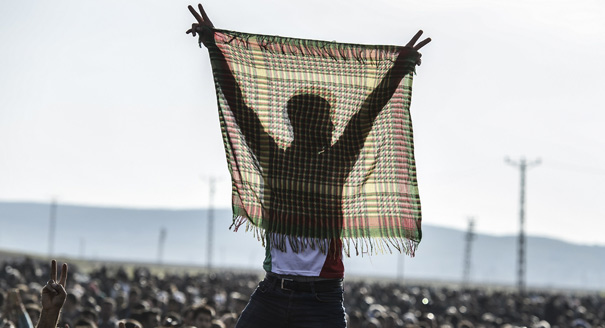Lina Khatib
{
"authors": [
"Lina Khatib"
],
"type": "legacyinthemedia",
"centerAffiliationAll": "dc",
"centers": [
"Carnegie Endowment for International Peace",
"Malcolm H. Kerr Carnegie Middle East Center"
],
"collections": [],
"englishNewsletterAll": "menaTransitions",
"nonEnglishNewsletterAll": "",
"primaryCenter": "Malcolm H. Kerr Carnegie Middle East Center",
"programAffiliation": "MEP",
"programs": [
"Middle East"
],
"projects": [],
"regions": [
"Gulf",
"Levant",
"Syria",
"Middle East"
],
"topics": [
"Political Reform",
"Security"
]
}
Source: Getty
Why ISIS Did Not Entirely Lose in Kobane
The Kurdish town of Kobane has been declared free of the Islamic State. But despite failing in its endeavor to control Kobane, the Islamic State is not a clear loser in this battle.
Source: Al-Hayat
After four months of on-the-ground fighting and airstrikes, the Kurdish town of Kobane has been declared free of Islamic State (ISIS) presence, following an attempt by the latter to take over this strategic town on the Syrian-Turkish border. The anti-ISIS international coalition has been quick to declare victory in this context, using success in Kobane to affirm that its military strategy is producing tangible results. But despite failing in its endeavor to control Kobane, the Islamic State is not a clear loser in this battle. Taking a look at the bigger picture reveals that the Islamic State still made gains as a result. The gains have as much to do with the creative use of military strategy and propaganda by ISIS as with weaknesses on part of the international coalition.
The northward expansion towards Kobane by the Islamic State was part of an attempt to reach a border crossing between Syria and Turkey. Turkey has been an important thoroughfare for the Islamic State because it is where its newly-recruited foreign fighters pass through on their way to Syria, and because of the presence of a black market in which the Islamic State has been selling its oil at severely discounted prices. Taking over a border crossing would have therefore given the Islamic State a significant strategic advantage. Although Turkish policy is officially opposed to the Islamic State, there are certain individuals in the Turkish government who are sympathetic to ISIS—seeing in it a way to fight the Syrian regime—and who have therefore contributed to Turkey’s turning a blind eye to Islamic State activity on the Turkish-Syrian border.
The Islamic State took advantage of this sympathy as well as of Turkish fears about the political ambitions of some of its Kurdish population—namely followers of the PKK who have been demanding the establishment of a Kurdish state—to escalate the level of its activity to reach the Syrian-Turkish border. As the Islamic State advanced closer to Turkey from inside Syria, and until the Islamic State reached the border town of Kobane, Turkey had kept rejecting calls from the anti-ISIS coalition to send support to Kurdish fighters in Syrian towns. Through this refusal, Turkey aimed to severely weaken the capability of Kurdish forces. The result was that prior to reaching Kobane, the Islamic State managed to control 70 Kurdish villages in Syria and to evacuate many of them of their inhabitants. Thus, despite not being able to take over Kobane, ISIS still gained more territory through this battle—the tactical withdrawal by ISIS from a number of villages around Kobane following its declaration of defeat in the battle is a normal part of the group’s military strategy that enables it to catch its breath before advancing again, even towards different areas.When Turkey finally agreed to open its borders to let Turkish Kurdish fighters enter Syria to help their Syrian counterparts, the Islamic State found itself trapped in Kobane. It was faced with two fatal choices: Either hold ground within the town and face this new onslaught from peshmerga and other Kurdish combatants, or flee and expose its fighters to the airstrikes of the international coalition. The first reaction by ISIS to this entrapment was not military but mediated: British hostage John Cantlie was made to appear in a video released by the Islamic State, in which he wanders around Kobane telling the camera that the town was dominated by ISIS. This was the first attempt by ISIS to compensate for military loss through propaganda.
But ISIS still found in the anticipated military loss in Kobane a strategic advantage: Fissures had begun to emerge within the ranks of ISIS fighters inside Syria, especially along national and ethnic lines but also among Syrian members of the organization. The leadership of the Islamic State had begun executing dissidents who had either questioned its leadership or had been seen as a cause of fracture among its different multinational brigades. Knowing that anyone sent to Kobane would face almost certain death, ISIS arranged for those members it wanted to get rid of to be assigned to Kobane. ISIS therefore used Kobane as a legitimate cover to “purify” its ranks.
As the battle of Kobane was drawing to an end, ISIS resorted once more to its tried-and-tested method to overcome its military losses: propaganda. ISIS had captured a Jordanian pilot, Lt. Moaz al-Kasasbeh, who had been participating in the airstrikes campaign, and proceeded to parade him naked from the waist down in a video. It also released another video showing the execution of one of two Japanese hostages and staged a video statement by the other hostage in which he called for the release of Sajida al-Rishawi—an al-Qaeda affiliate who has been on death row in Jordan for 9 years following a failed terrorism attempt—in return for his safety.
The three videos courted much media attention and pushed Jordan to publicly declare its agreement to release al-Rishawi in return for the Jordanian pilot, especially after members of the tribe that the pilot belongs to protested in Amman asking the government to work harder to secure his release. The Jordanian government’s declaration therefore is the result of fears about both ISIS as well as potential internal instability caused by upsetting the tribes. Following Jordan’s declaration, ISIS promptly responded by announcing the execution of the second Japanese hostage and then the Jordanian pilot. In doing so, the Islamic State managed to humiliate both Japan and Jordan, two members of the international coalition. The fate of the Jordanian pilot has been a way to put pressure on the Jordanian government, but also extends to pressure on all countries participating in the coalition.
The series of events around Kobane show a pattern that has now become established: Whenever ISIS feels overstretched militarily, it resorts to psychological warfare through propaganda to compensate for this weakness. Although the international coalition won the battle of Kobane militarily, it lost the image war. Jordan’s open negotiation with the Islamic State has given the latter a significant boost as it has enabled it to humiliate an Arab state and expose Jordan’s fears about domestic and external causes of instability. The Kobane events have also exposed the weaknesses of the international coalition, showing that it does not have a coherent strategy for dealing with hostage crises, since Japan refused to negotiate while Jordan did. They have also highlighted the limitations of the coalition’s influence on Turkey, whose refusal to cooperate while ISIS was advancing towards Kobane facilitated the geographical expansion of the Islamic State. ISIS has also managed to turn its military losses into an advantage through using Kobane as a purgatory for dissidents. The liberators of Kobane deserve credit for saving the town, but the bigger picture reveals a much darker scenario at play in the war against the Islamic State.
This is an updated version of an article which was originally published in Arabic by Al-Hayat.
About the Author
Former Director, Middle East Center
Khatib was director of the Carnegie Middle East Center in Beirut. Previously, she was the co-founding head of the Program on Arab Reform and Democracy at Stanford University’s Center on Democracy, Development, and the Rule of Law.
- Syria's Last Best Hope: The Southern FrontIn The Media
- The Islamic State’s Strategy: Lasting and ExpandingPaper
Lina Khatib
Recent Work
Carnegie does not take institutional positions on public policy issues; the views represented herein are those of the author(s) and do not necessarily reflect the views of Carnegie, its staff, or its trustees.
More Work from Carnegie Endowment for International Peace
- Iran Is Pushing Its Neighbors Toward the United StatesCommentary
Tehran’s attacks are reshaping the security situation in the Middle East—and forcing the region’s clock to tick backward once again.
Amr Hamzawy
- The Gulf Monarchies Are Caught Between Iran’s Desperation and the U.S.’s RecklessnessCommentary
Only collective security can protect fragile economic models.
Andrew Leber
- Duqm at the Crossroads: Oman’s Strategic Port and Its Role in Vision 2040Commentary
In a volatile Middle East, the Omani port of Duqm offers stability, neutrality, and opportunity. Could this hidden port become the ultimate safe harbor for global trade?
Giorgio Cafiero, Samuel Ramani
- Europe on Iran: Gone with the WindCommentary
Europe’s reaction to the war in Iran has been disunited and meek, a far cry from its previously leading role in diplomacy with Tehran. To avoid being condemned to the sidelines while escalation continues, Brussels needs to stand up for international law.
Pierre Vimont
- What We Know About Drone Use in the Iran WarCommentary
Two experts discuss how drone technology is shaping yet another conflict and what the United States can learn from Ukraine.
Steve Feldstein, Dara Massicot









